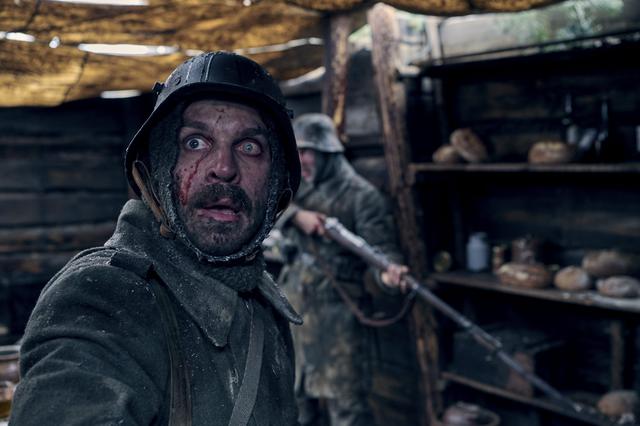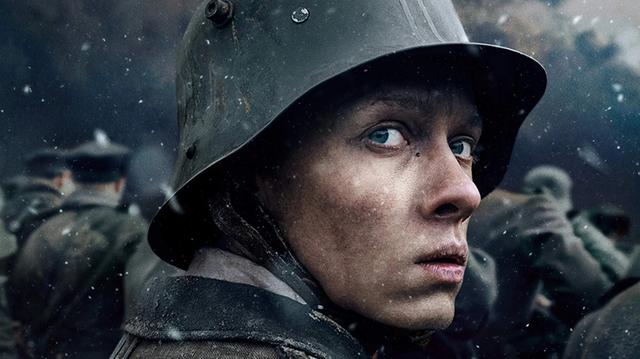Peace Vet Journal
Camillo Mac Bica
Admin@camillobica.com
_______________________________________
Edward Berger’s Failed Adaptation
of “All Quiet on the Western Front”
S
Sadly, what the screenwriters and film critics who lauded the production failed to realize, however, was that in alleging their creation to be an adaptation of “All Quiet on the Western Front,” they were accepting an obligation that far exceeded creating a work of art or of war pornography intended to stun viewers with its gut-wrenchingly and truly horrific battle scenes of death and destruction. Rather, given the importance of Remarque’s work, they were incurring a profound responsibility to embrace as faithfully as possible in a cinematic format, a truly timeless and seminal study of war and the manner in which governments mythologize the experience in order to entice, perhaps coerce is better, and then to indoctrinate and condition young men and now women to march blindly off to slaughter and to be slaughtered on the battlefield.
What distinguishes “All Quiet on the Western Front” from other books and films depicting the horror and destruction of war, is Remarque’s experience-based, deep understanding of the phenomenon of war and of the lies military and political leaders tell that war is necessary, glorious, noble and that patriotism and love of Country require selfless service and sacrifice. It is his literary genius in portraying characters and events that make war’s psychological, emotional, and moral impact—the despair, overwhelming fear, and trauma—so clear and apparent that even those who were fortunate not to have experienced the battlefield can not only understand but, more importantly, feel the war. It is Remarques’ courage to relive the horror and to allow his readers access to experiences I am sure even he would rather forget.
I have no doubt that those who appreciate the craft of filmmaking and delight in war pornography will certainly find something here to admire and enjoy. Given the extensive liberties, however, taken by screenwriters Berger, Lesley Patterson, and Ian Stokell, this Netflix film so radically strays from Remarque’s intent and purpose—with its additions and omissions—that I am impelled to question whether the decision to market the film as an adaptation of “All Quiet on the Western Front” was at best a mistake, at worst a marketing strategy, hoping perhaps to increase interest and provide Berger’s film with a level of credibility and importance it would otherwise fail to warrant. For the remainder of this article, to justify my observations and criticism, I will enumerate only several of the film’s most egregious shortcomings.
Kemmerich’s Boots
Why deprive the viewer of experiencing Paul Baumer’s and Fredrich Muller’s visit to the bedside of mortally wounded Franz Kemmerich and the discussion of the loss of a comrade, the futility and waste of war, all disguised as Muller’s rather rude, though practical pleas for Kemmerich’s plush boots upon his impending death. Truly superlative writing indicative of Remarque’s intent and genius, none of which was thought worthy of inclusion in the current “adaptation.”
“Now he is lying there — and for what reason? Everybody in the whole world ought to be made to walk past his bed and be told: “This is Franz Kemmerich: he is nineteen and a half, and he doesn’t want to die! Don’t let him die!” (Remarque, 1929, p. 29)
For Remarque, though clearly not Berger, “All Quiet on the Western Front” is intended as a walk past Kemmerich’s bed.
Dehumanizing the Enemy
Another memorable incident from All Quiet whose importance was diminished by being only superficially mentioned in Berger’s film was the tragic confrontation between Paul Baumer and the enemy soldier who sought refuge in the bomb crater in which Paul was hiding. After impulsively stabbing the Frenchman, Paul (and the reader) learn that the suffering soldier’s name was Gerard Duval, and that he was a printer, with a wife and child who will never see him again. Paul is emotionally overwhelmed with regret as he realizes the humanity of the other and the repugnance of what he had done, all lost in the current adaptation.
“But now, for the first time, I see you are a man like me. I thought of your hand-grenades, of your bayonet, of your rifle; now I see your wife and your face and our fellowship. Forgive me, comrade. We always see it too late. Why do they never tell us that you are poor devils like us, that your mothers are just as anxious as ours, and that we have the same fear of death, and the same dying and the same agony — Forgive me, comrade; how could you be my enemy?” (Remarque, 1929, p. 223)
What Remarque is focusing upon of course is Paul’s realization that he had been conditioned to dehumanize and to hate Duval as an enemy as part of the deception necessary if human beings are to become effective warriors and overcome their instinctive reluctance to kill. Inevitably, however, the deception is revealed and Paul, the warrior, is left to confront the guilt, shame, anguish, and grief—the moral injury—that accompanies the realization that he has killed a “poor devil” like himself. Such an important scene, a poignant depiction of what I have termed elsewhere as the Psychological, Emotional and Moral (PEM) Injuries of war.
His name, it is a nail that will be hammered into me and never come out again. This man is bound up with my life, therefore I must do everything, promise everything in order to save myself: I swear blindly that I mean to live only for his sake and his family. (Remarque, 1929, p. 147–148)
Alienation
Omitted as well is Remarque’s poignant account of Paul’s return home on furlough, his alienation from his family and from his past. Of his visit to his old teacher Kantorek’s classroom, where he felt compelled to tell the truth about war, truth that received condemnation and accusations of cowardice from Kantorek and his current group of “motivated” students. Remarque brilliantly portrays and provides insight into the abandonment, isolation, and alienation so many warriors suffer following their return home after having experienced death and destruction — having grown old — at the front. While on leave, Paul is conflicted,
in the trenches. They are different men here, men I cannot properly understand, whom I envy and despise.” (Remarque, 1929, p. 169)
Disconnected from their ethical foundations — their frame of reference with which to structure their world — returning warriors’ lives no longer had meaning, their world became incoherent, and their relationship to it and to other human beings, even close loved ones, became incomprehensible. Paul elaborates.
“You are at home, you are at home. But a sense of strangeness will not leave me. I cannot feel at home amongst these things. There is my mother, there is my sister, there my case of butterflies, and there the mahogany piano — but I am not myself there. There is a distance, a veil between us . . . It is I, of course that have changed in the interval. There lies a gulf between that time and today . . . But now I see that I have been crushed without knowing it. I find I do not belong here anymore, it is a foreign world.” (Remarque, 1929, p. 160, 169)
Conclusion
"All Quiet on the Western Front" is a masterful work of truth-telling. Remarque’s writing, observations, and insights demonstrate a profound understanding of the nature of war, its consequences, and the difficulties warriors and veterans suffer having to cope with traumatic battlefield experiences and memories. His dialogue and imagery engage the reader both intellectually and emotionally allowing access to a world alien to all except the relatively few who have suffered the horror of war firsthand.
It is no wonder, then, that so many who read All Quiet understand and feel the obscenity and evil of war, no wonder they perceive the novel as antiwar. As Remarque makes clear in his introduction, however, "All Quiet on the Western Front" was not politically motivated. Nor was his primary intent to advocate for a pacifistic ideology, though his experiences in the trenches had certainly convinced him of war’s futility and waste.
This book is to be neither an accusation nor a confession, and least of all an adventure, for death is not an adventure to those who stand face to face with it. It will try simply to tell of a generation of men who, even though they may have escaped shells, were destroyed by war. (Remarque, 1929, Introduction.)”
Sadly, Berger missed the true point, depth, and greatness of Remarque’s novel entirely, choosing instead to focus primarily on horrific battlefield scenes and shattered bodies. What we have in the Netflix film is war porn, albeit expertly done, superficially disguised as a new adaptation of "All Quiet on the Western Front," arguably the greatest novel on war ever written and what should be required reading for anyone contemplating enlisting in the military and/or sending young men and women to fight, kill, and to die in war.
So, if the horror and the excitement of the battlefield are what you seek, you can certainly find them in Berger’s film. But if you want more, if you want to understand, perhaps even to feel the experience as brilliantly portrayed by Erich Maria Remarque, then read his book. If cinema is your preference, seek out Lewis Milestone’s adaptation and winner of the 1930 Academy Award for Best Picture and Best Director. What you may lose in elaborate 21st-century technology, you will make up for with a better, more complete sense of the nature of war, and the realization that fidelity to the original and to the author’s intent can be compatible with exceptional filmmaking.
As a work of art, Edward Berger’s highly anticipated Netflix adaptation of Erich Maria Remarque’s “All Quiet on the Western Front” certainly deserves all the praise and accolades“ it has garnered for fine filmmaking, cinematographic excellence, production design, and stunning performances by an impressive ensemble cast of German-speaking actors.

Use Guestbook to comment on the article
“When I see them here, in their rooms, in their offices, about their occupations, I feel an irresistible attraction in it, I would like to be here too and forget the war; but also it repels me, it is so narrow . . . while out at the front the splinters are whining over the shell-holes and star-shells go up, the wounded are carried back on waterproof sheets and comrades crouch
Published at Common Dreams https://www.commondreams.org/views/2022/11/07/netflixs-failed-adaptation-all-quiet-western-front fbclid=IwAR1c8WiThOjHKg07umQ7CnBcc9m8hn0ImCmkVgLjlfH4iyJPfBZrHylP7wA
Copyright © Camillo Mac Bica • All Rights Reserved

